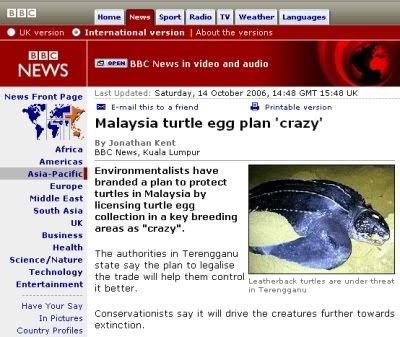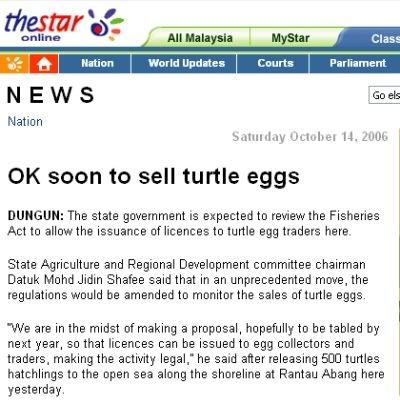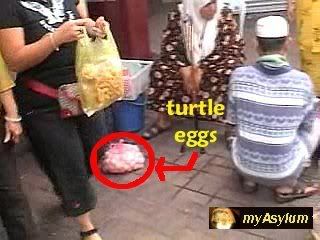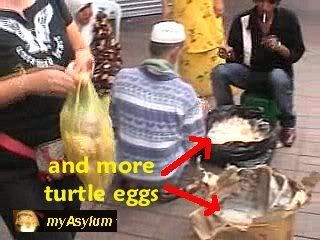Turning Turtle
Technorati tags: Environment, Wildlife, Marine, Conservation, Marine Turtles, Terengganu, Malaysia
If there is one other species that's fast becoming extinct, apart from the Leatherback Turtle, it's sensible politicians/lawmakers.
 Lifting the ban on turtle egg sales as a way to protect sea turtles?
Lifting the ban on turtle egg sales as a way to protect sea turtles?
Some may even argue that the species never existed in the first place. Well, perhaps there is some truth to back that assertion. The BBC article above is a response to the following news item that appeared in The Star on Saturday, October 14.
 Regulation, or opening the floodgates of destruction?
Regulation, or opening the floodgates of destruction?
The move to "regulate" turtle egg sales, versus a better monitored ban, in Walski's view, is a lazy, easy-way-out method of showing that the Terengganu is doing something positive, while in fact what they're doing is putting Malayia sea turtles in greater jeopardy (Leatherbacks, OIive-Ridleys, Greens, and Hawksbills).
Walski, for one, can attest that the turtle egg business continues to go unabated, despite the fact that it's legality is somewhat dubious. The following two pictures were taken at the Kuala Terengganu Central Market (Pasar Payang) this past August. And this is happening while the trade is still illegal - imagine what it would be like once the ban is lifted.
(turtles eggs, clownfish, and more, in the full post)

 Eggs of the endangered turtle, anyone?
Eggs of the endangered turtle, anyone?
If memory serves Walski correctly, these were selling for about RM 1 (or so) an egg. It was kinda sad to see these being sold openly, and the fact that poaching these eggs goes on, albeit not rampantly, in Terengganu. Walski also found out that the bulk of the eggs sold don't actually come from Terengganu, but from East Malaysia (primarily Sarawak) and Indonesia. Regardless, these marine turtle eggs are still considered a delicacy.
Even while the number of Leatherback landings in Terengganu have been reported to have decreased tremendously over the years. The consumption of these eggs continues.
But the Terengganu government is in quite a quandry. Coming down harder on this trade would probably be another weapon in the arsenal of PAS (Pan-Malaysian Islamic Party, the political party trying hard to recover the state). As it is, funding for the Fisheries Department is probably insufficient to properly carry out surveillance and patrolling of known turtle landing spots, on the mainland and the islands surrounding Terengganu.
Egg poaching may be a problem. But another problem plauging the marine turtles is the fishing industry, which has been known to become the inadvertent predator of adult sea turtles. Walski's not implying that the fishermen are doing this on purpose, but when the awareness of how important conserving our marine wildlife heritage doesn't seem to be there, it's no surprise when enough care is not taken to ensure that the turtles don't become unintended casualties of the fishing industry.
Enforcement is one thing, but the awareness within the fishing folk themselves is equally as important. Walski somehow thinks that not enough care is given when laying these dragnets of death. The catch become the only focus, regardless of what it is that eventually gets caught.
Perhaps greater efforts should be made by the Terengganu government to intensify the promotion of environmental awareness among its citizenry, rather than only spending money on enforcement. It may take longer, but awareness is probably a better long-term solution.
On a related note, the Terengganu government earlier this year, in May, dropped the Leatherback Turtle as the state sprots mascot, in favor of the Clownfish. Let's also hope this ominous move isn't an indication that the state government is in the process of evolving into clowns themselves, simply trying out crazy environmental "protection" measures, which are more far from being good measures.
Environmental conservation is the responsibility of not just the concerned agencies. It is the duty and responsibility of all citizens. Without the right awareness, Terengganu folk will probably still consider turtle eggs as delicacies they cannot do without.
And to borrow from the clichéd advertorial tagline: "Once the eating stops, so too will the poaching".
















